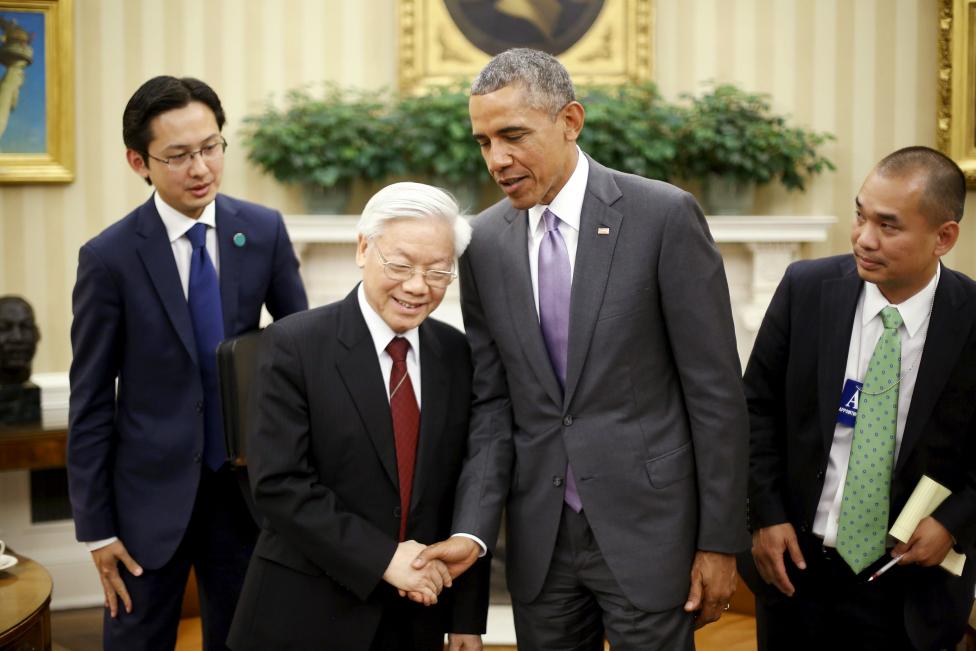U.S. President Barack Obama is planning to visit Vietnam later this month with trade, security and human rights on his agenda, in addition to a three-decade-old arms embargo on Vietnam, U.S. officials said, adding that “no decision” has been reached yet to remove the ban.
The visit comes as Obama tries to seal his flagship, but all too often distracted, “pivot” to Asia, hoping to buttress Washington’s influence in a region where China’s growing territorial assertiveness in the South China Sea has flustered many neighbors.
The debate within the U.S. administration is coming to a head amid preparations for Obama’s trip to Vietnam this month to bolster ties between Washington and Hanoi, former wartime enemies.
After the partial lifting on arms sales to Vietnam in 2014, Vietnam has sought a complete removal of the embargo that would sweep away one of the last major vestiges of the Vietnam War era and advance the normalization of relations that started 21 years ago. It would also likely anger Beijing, which condemned Obama’s partial lifting of the arms ban in 2014 as an interference in the region’s balance of power.
Internally, some White House and State Department aides say it would be premature to completely end restrictions on lethal military assistance before Vietnam’s communist government has made more progress on human rights. While other officials, including many at the Pentagon, argue that bolstering Vietnam’s ability to counter a rising China should take priority, according to people with knowledge of the discussions.
U.S. Assistant Secretary of State for East Asian and Pacific Affairs Daniel Russel on Tuesday said the move was far from settled. Speaking in Hanoi on Tuesday, Russel said the embargo lifting was still “under periodic review” and would be looked at seriously, although he made it clear Vietnam’s commitment to human rights would be central to any decision.
“No decision has been made,” on dropping the embargo, Russel said during a visit to Hanoi to pave the way for the president.
“One of the important factors that would make a lift of the ban possible would be continued forward momentum in meeting universal human rights standards and progress in important legal reforms.”
Boosting the security of allies and partners has been a major thrust of Obama’s strategic “pivot” toward the Asia-Pacific region, a centerpiece of his foreign policy.
Even as Vietnam seeks warmer relations with the United States, though, U.S. officials are mindful that suspicions linger among Communist Party conservatives that Washington wants to undermine their country’s one-party system.
Obama’s final decision could hinge on whatever recommendations come from ongoing visits to Vietnam by Tom Malinowski, the administration’s top human rights envoy, and Daniel Russel, the Assistant Secretary of State for East Asia and the Pacific.
It was not clear whether Obama was leaning for or against ending the embargo ahead of his trip, which will make him the third consecutive U.S. president to visit Vietnam.
Obama eased the ban on lethal arms sales to Vietnam in October 2014, allowing shipments of defensive maritime equipment to help Hanoi build up its deterrent to China’s pursuit of its claims in the South China Sea, which conflict with those of its neighbors such as Vietnam and U.S. ally the Philippines.
“UNDESERVED AT THIS TIME”
John Sifton, Asia advocacy director for Human Rights Watch, said lifting the arms ban would be “undeserved at this time.” The group, in an April 27 letter sent to Obama, described the Vietnamese government as “among the most repressive in the world.”
While a number of U.S. lawmakers favor closer military ties with Vietnam because of shared concerns about China, others have deep reservations.
Democratic U.S. Representative Loretta Sanchez, a member of the Congressional Caucus on Vietnam who also has a large Vietnamese-American voting bloc in her California district, said lifting the embargo would be “giving a free pass to a government that continually harasses, detains and imprisons its citizens.”
Obama has the power to bypass Congress to lift the embargo. But his administration would hope for support from Republican U.S. Senator John McCain, a decorated former prisoner of war in North Vietnam who backed the 2014 partial lifting.
Some U.S. officials see signs that Vietnam is starting to pay attention to human rights criticism. But concerns remain over the government’s heavy-handedness toward political opponents and treatment of workers and there is worry that Washington will lose some leverage if it gives up the arms embargo without securing concessions for reforms.
One senior U.S. official suggested that it might be best for now to “set the issue of the lethal weapons ban aside.”
“These things do take time,” the official said. But others said the door should remain open to lifting the embargo as preparations precede Obama’s visit.
If Obama opts against removing the ban for now, another option that might quell the Vietnamese would be creating a “working group” to map out the path toward doing so, one U.S. official said.
